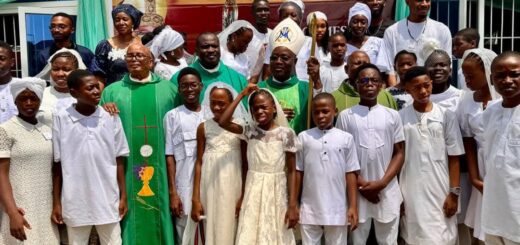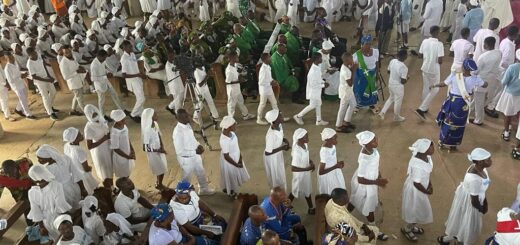DO NOT ALLOW YOUR POSSESSIONS TO POSSESS YOU
by ARCH BISHOP · August 3, 2025
18TH SUNDAY, YEAR C, OUR LADY QUEEN OF NIGERIA PRO-CATHEDRAL, ABUJA. HOMILY BY ARCHBISHOP I.A.KAIGAMA, 3RD AUGUST, 2025.
READINGS: ECCLESIASTES 1:2;2:21-23; COLOSSIANS 3:1-5.9-11; LUKE 12:13-21
THEME: DO NOT ALLOW YOUR POSSESSIONS TO POSSESS YOU
My dear people of God, we give thanks to God for the gift of this day to celebrate the 18th Sunday in Ordinary time in the Pro-Cathedral and our Archdiocese, to celebrate our grandparents and the elderly, and in a special way today, our parishioner, Chief Mama Felicia Sani, OON, who marks her 90th birthday today.
We are living in times when the temptation to exempt God from our daily life is increasing, especially among those who are in positions of authority or intellectually known as gurus. Fortunately, Mrs. Felicia Sani does not belong to that category. For her, nothing is more precious than the kingdom of heaven.
It is God’s grace that has guided Chief Mrs. Felicia Sani, born 22nd July, 1935, to dedicate her life to God. Even though with a B.Sc. in Banking and Finance, Founder, Market Men and founder of various market Associations in Benin City, Jos, Abuja and the founder of Market Men and Women Association of Nigeria, a mother of 4 Children, 26 Grandchildren and Great Grandchildren, she believes that her achievements in life are due to God’s graces and blessings.
Yesterday, we celebrated another selfless, generous, dedicated, and great member of the Archdiocese of Abuja, Sir Peter Aliu, at Holy Trinity, Maitama. God has blessed us with such good people who have made great contributions to society, while not forgetting their God, by serving the Church with all their heart and mind without counting the cost.
Today’s readings essentially spur us to reflect on how our relationship with material things should be. They invite us to reflect deeply on the fleeting nature of earthly possessions and the eternal treasures that await us in God’s kingdom.
In the First Reading, the author of the book of Ecclesiastes echoes a common experience of human disillusionment with life. He ponders the vanity of chasing after worldly goods. Thus, he exclaims: “Vanity of vanities!” emphasizing the emptiness of amassing wealth and possessions without considering their ultimate purpose – to be used for the glory of God. In our contemporary context, this resonates profoundly, as we often find our leaders, both political and religious, consumed by the pursuit of material success, sometimes at the expense of their spiritual well-being and the good of the general populace, and not just our leaders, all of us. We are all culpable in one way or another, especially when we attach so much of ourselves to created things.
The parable in the Gospel powerfully illustrates how attachment to wealth – the desire to acquire, hold on to, and enhance it – prevents people from attending to the relationship with God that brings the only security that counts in the long run. Wealth should not be considered an absolute good. It does not guarantee salvation. In fact, it can even seriously jeopardise it when it is idolised. Jesus calls the rich man in the Gospel “fool” because he does not learn from the experience of visible things that nothing lasts forever, but that all things pass away. Making one’s life depend on such ephemeral realities is, therefore, foolishness.
The brevity of life and the certainty of death remind us of the futility of much human striving for success. The Psalmist furthermore reminds us: “We take nothing with us when we die. Our wealth does not follow us to the grave” (Ps. 49:17). Nothing is more destructive of life and humanity than preoccupation with acquiring, holding on to, and increasing wealth regardless of the living condition of others. The riches of this life are potentially good; their goodness is actualised when they serve the greater good – the glory of God – and the love of neighbour.
St. Ignatius of Loyola, whose memorial we celebrated three days ago, in setting out the First Principle and Foundation in His Spiritual Exercises, writes: “All other things on the face of the earth are created for human beings in order to help them pursue the end for which they are created. It follows from this that one must use other created things, in so far as they help towards one’s end, and free oneself from them, in so far as they are obstacles to one’s end.”
The true measure of our wealth lies not in what we accumulate for ourselves but in how we share with others, especially the less fortunate. We must learn to share with the less fortunate and those in need, the temporal goods God has blessed us with. Always remember, when we stand before God’s judgement throne, He will not ask how much we stored, but how much we shared; He will not ask how big our barns were, but how open our hands were. When our hard work pays off and has brought plentiful harvest, it is not time to build a high wall and employ the highest security, we should rather build a long table inviting others to share with us, because, nothing will follow us out of this world except the good we have done with the goods God has blessed us with.
As we gather here today, let us examine our own hearts and alsocall on our leaders who manage our material resources. Are we, like the rich man in the Gospel, overly focused on accumulating wealth and possessions? Do we trust in these earthly treasures more than we trust in God’s providence? The pursuit of material goods, while necessary for our daily lives, should never distract us from our ultimate goal: eternal life with God. It is not bad to work hard, to acquire material goods. What is bad is when those material things become everything to us.
To our dear leaders, remember that old age, if God blesses you with it, will come to us, and the power, might, influence, and riches may be there physically, but you will be very weak to use or enjoy them. The old need to give the young ones hope for a better life, so that the young can grow with the knowledge of love and responsibility. Provide political space for the young; groom them; inspire them to true patriotism; rather than take up all their political and economic spaces by recycling yourselves over and over and leaving the youth in frustration and desperation, because they have no money to compete with the older ones, even though they have the skills and ability. We ruin the future of the youth by borrowing so much that we cannot pay and leave office heavily indebted, leaving our youth a very bleak future. If the loans were properly, honestly, and strategically utilized, and the results are visible, one would not worry. But unfortunately, one sees very little that is there for the common good and for posterity. Even as we remember our elderly, let us ask what social welfare scheme does our nation have in place for them? How many have been paid their entitlements after long years of meritorious service? It is not only enough to remember and pray for grandparents and the elderly, Nigeria must be deliberate in providing for their needs as is done in other countries until God calls them, never to allow them to suffer under the burden of age and social deprivation.
Sadly, many of us who are entrusted with so much resources do not care about the people we are placed with the responsibility to distribute these resources to. We buy very expensive cars that we do not even use; go in a convoy of long, expensive vehicles for unjustifiable reasons other than to show affluence or the glamour of power. When you look at the number of poor people in our country today, you will be tempted to think that we are a very poor nation, but that is not the case. We are like this because a few greedy individuals whom we place at the helm of our affairs have become greedy and only care about amassing wealth for themselves and their children. Some illegitimately acquire money that they cannot spend a quarter of it in their lifetime.
Last Sunday, the Holy Father, Pope Leo XIV, in his message for the World Day of Grandparents and the Elderly, said, “God thus teaches us that, in his eyes, old age is a time of blessing and grace, and that the elderly are, for him, the first witnesses of hope.” He went on to say, ‘Augustine asks, ‘What do we mean by old age?’ He tells us that God himself answers the question: ‘Let your strength fail, so that my strength may abide within you, and you can say with the Apostle, ‘When I am weak, then I am strong’ (Super Ps. 70,11).” The elderly are signs of hope. The Holy Father, therefore, calls us to seek out the elderly who are living alone.
Looking at the elderly in the spirit of this Jubilee, we are called to help them experience liberation, especially from loneliness and abandonment. This year of hope is a fitting time to do so.
We as an Archdiocese, have chosen this Sunday, 3rd of August,2025, to step it down; to seek out our beloved grandparents and the elderly in our Archdiocese; to celebrate them; and to tell them that we love them and pray for God’s continued blessings upon them. Providentially, today we celebrate in a very special way, one of them, Mama Felicia Sani, who marks her 90th birthday. Mama is still full of life, still strong and bouncing in the Lord. At her age, mama is still very active in church and makes sure that at her expense, the altar is well decorated with beautiful flowers every Sunday. That shows the love she has for God and His Church.
We thank our grandparents and the elderly for all their labourand sacrifices for us. May God Almighty bless them, grant them His strength and blessings for the rest of their lives.
I thank also, in a very special way, the members of the Family and Human Life Commission, under the leadership of Sir Dan Okekenta and his team, who organized a one-week program in our Archdiocese to celebrate the old and elderly, giving them a reason to smile, knowing how much they are loved by all of us. God bless you all and also grant you length of life, filled with strength and health.
All of us should live Christ-centered lives. Let us kill everything in us that belongs only to earthly life; let us heed the call to transform our lives, a call to purity of life, and a call to remain steadfast, because a life well-lived on earth will qualify us for the heavenly banquet.
The Preacher (Qoheleth) calls us to remember God in all we do. He reminds us that there will be an ultimate end to all created things. He also reminds us that the ultimate goal here on earth is to walk straight to heaven.
May our Mother Mary continue to intercede for us and our country with God, to make our journey to heaven smooth and to enkindle in us the grace to be rich in faith, hope, and love, virtues that endure beyond this life and can guarantee us eternal life and salvation.




